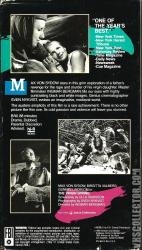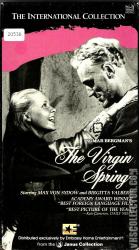The Virgin Spring
Catalog Number
6160
-
Primary Distributor (If not listed, select "OTHER")
Catalog Number
6160
Primary Distributor (If not listed, select "OTHER")
Distributor Series
Release Year
Country
N/A (NTSC)
N/A | N/A | N/A
N/A | N/A
Jungfrukällan (1960)
Additional Information
Additional Information
Inspired by a medieval Swedish ballad, Ingmar Bergman's The Virgin Spring (Jungfrukallan) begins with a scene of unspeakable brutality and ends with an image of uncommon beauty. 15-year-old Birgitta Peterson, on her way to church to light candles for the Virgin Mary, is raped and murdered by two older men. The men look for shelter at the home of Birgitta's father (Max Von Sydow), who murders the bestial killers in cold blood. When the deed is done, Von Sydow, a deeply religious man, begins to question the efficacy of a God that would allow his daughter's death, then permit so bloody a retribution. Then, a fresh, virgin spring bubbles from the ground where his daughter had been lying a few moments before. Taking this natural phenonenon as a sign from above, Von Sydow vows to erect a church on the spot where Birgitta met her doom. The winner of the "best foreign picture" Academy Award, The Virgin Spring currently exists in several versions of varying lengths; the longest, and most graphic, is the original Swedish cut. Believe it or not, this hauntingly beautiful film served as the basis of The Last House on the Left (1972).
The Virgin Spring (Swedish: Jungfrukällan) is a 1960 Swedish film directed by Ingmar Bergman. Set in medieval Sweden, it is a revenge tale about a father's merciless response to the rape and murder of his young daughter. The story was adapted by screenwriter Ulla Isaksson from a 13th-century Swedish ballad, "Töres döttrar i Wänge" ("Töre's daughters in Vänge"). The film contains a number of themes that question morals, justice and religious beliefs; it was considered controversial when first released due to its infamous rape scene. It won for Best Foreign Language Film at the 1961 Academy Awards[2] and was also the basis for the 1972 exploitation horror film The Last House on the Left.[3]
The Virgin Spring tells the story, set in medieval Sweden, of a prosperous Christian whose daughter, Karin (Birgitta Pettersson), is appointed to take candles to the church. Karin is accompanied by her pregnant maid servant, Ingeri (Gunnel Lindblom), who secretly worships the Norse deity Odin. Along their way through the forest on horseback, Ingeri becomes frightened when they come to a stream-side mill and the two part and Karin sets out on her own.
Ingeri encounters a one-eyed man at the stream-side mill. When Ingeri asks about his name he enigmatically responds he has none "in these days". The man tells Ingeri that he can see and hear things others can not. When the man makes sexual advances towards her and promises her power, Ingeri flees in terror. Meanwhile, Karin meets three herdsmen (two men and a boy) and invites them to eat her lunch with her. Eventually, the two older men rape and murder Karin while Ingeri watches, hidden, from a distance. The two older men then leave the scene with Karin's clothing. The younger (a boy) is left with the body and to watch the goats, but he takes the situation poorly and quickly becomes sick with guilt.
The herders then, unknowingly, seek shelter at the home of the murdered girl. Her parents, played by Max von Sydow and Birgitta Valberg, discover that the goat herders murdered their daughter when the goat herders offer to sell Karin's clothes to her mother. After they fall asleep, the mother locks the trio in the chamber. Ingeri returns to the farm and breaks down in front of the father; she tells him about the rape and confesses that she secretly wished for Karin's death out of jealousy. She does not mention her encounter with the one-eyed man. In a rage, the father stabs one of the herders to death with a strange dagger before killing the other two (the little boy included) with his bare hands.
The next day, the parents set out to find their daughter's body with the help of Ingeri. Her father vows that, although he cannot understand why God would allow such a thing to happen, he will build a church at the site of his daughter's death. As her parents lift her head from the ground, a spring begins to flow from where she was lying. Ingeri then begins to wash herself with the water and Karin's parents clean their daughter's muddied face.
The Virgin Spring (Swedish: Jungfrukällan) is a 1960 Swedish film directed by Ingmar Bergman. Set in medieval Sweden, it is a revenge tale about a father's merciless response to the rape and murder of his young daughter. The story was adapted by screenwriter Ulla Isaksson from a 13th-century Swedish ballad, "Töres döttrar i Wänge" ("Töre's daughters in Vänge"). The film contains a number of themes that question morals, justice and religious beliefs; it was considered controversial when first released due to its infamous rape scene. It won for Best Foreign Language Film at the 1961 Academy Awards[2] and was also the basis for the 1972 exploitation horror film The Last House on the Left.[3]
The Virgin Spring tells the story, set in medieval Sweden, of a prosperous Christian whose daughter, Karin (Birgitta Pettersson), is appointed to take candles to the church. Karin is accompanied by her pregnant maid servant, Ingeri (Gunnel Lindblom), who secretly worships the Norse deity Odin. Along their way through the forest on horseback, Ingeri becomes frightened when they come to a stream-side mill and the two part and Karin sets out on her own.
Ingeri encounters a one-eyed man at the stream-side mill. When Ingeri asks about his name he enigmatically responds he has none "in these days". The man tells Ingeri that he can see and hear things others can not. When the man makes sexual advances towards her and promises her power, Ingeri flees in terror. Meanwhile, Karin meets three herdsmen (two men and a boy) and invites them to eat her lunch with her. Eventually, the two older men rape and murder Karin while Ingeri watches, hidden, from a distance. The two older men then leave the scene with Karin's clothing. The younger (a boy) is left with the body and to watch the goats, but he takes the situation poorly and quickly becomes sick with guilt.
The herders then, unknowingly, seek shelter at the home of the murdered girl. Her parents, played by Max von Sydow and Birgitta Valberg, discover that the goat herders murdered their daughter when the goat herders offer to sell Karin's clothes to her mother. After they fall asleep, the mother locks the trio in the chamber. Ingeri returns to the farm and breaks down in front of the father; she tells him about the rape and confesses that she secretly wished for Karin's death out of jealousy. She does not mention her encounter with the one-eyed man. In a rage, the father stabs one of the herders to death with a strange dagger before killing the other two (the little boy included) with his bare hands.
The next day, the parents set out to find their daughter's body with the help of Ingeri. Her father vows that, although he cannot understand why God would allow such a thing to happen, he will build a church at the site of his daughter's death. As her parents lift her head from the ground, a spring begins to flow from where she was lying. Ingeri then begins to wash herself with the water and Karin's parents clean their daughter's muddied face.






Comments0
Login / Register to post comments